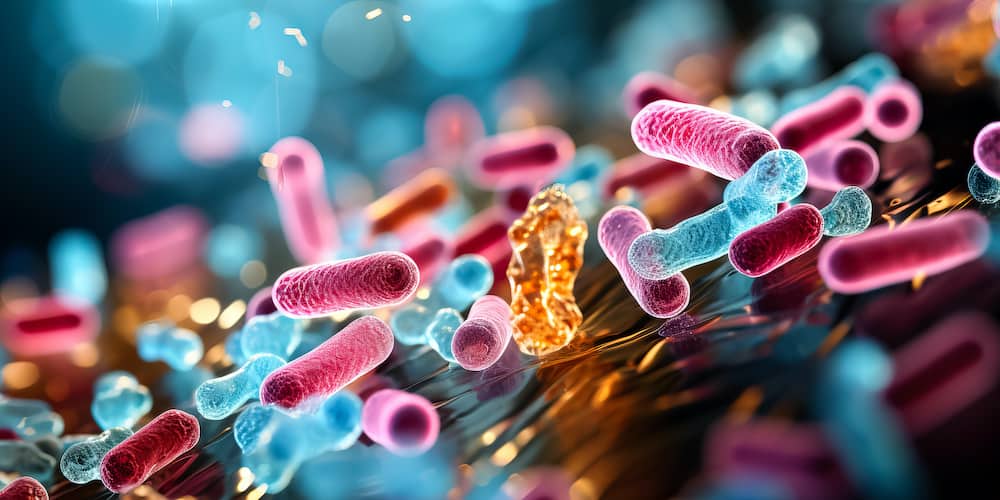The gut flora, more than just a resident of our digestive system, is a dynamic microbial community essential for our well-being. It is at the heart of many bodily functions, orchestrating a complex dance with our digestion, our immunity… And even our mood.
When disruptors such as antibiotics, stress, or an imbalanced diet come into play, this harmony is disrupted.
On the agenda: bloating (even after drinking a glass of water), skin problems, chronic fatigue, digestive disorders, recurring yeast infections, or cystitis. These are recurring examples that I see in the pharmacy.
But how long does it take to restore this complex microbiota? And what are the best strategies to accelerate this process? I tell you everything you need to know about rebuilding your microbiota.
📚 Read also | A pharmacist tells us how to choose the best probiotics
Rebuilding the Microbiota
A transition period of 3 to 6 months
According to some studies, the microbiota can take between 3 to 6 months to rebuild after a disturbance. However, the severity and nature of the disturbance can significantly influence this timeframe.
For example, winter infections or pinworm infestations can cause temporary changes in the composition of the gut microbiota.
Meanwhile, traveler’s diarrhea, also known as tourista, can lead to prolonged and more severe disruptions, as shown in this article.
In the extreme case of a nosocomial infection due to a multi-resistant strain of Clostridium difficile, a fecal transplant may be necessary to achieve complete remission. This is mentioned by this team.
Supporting the resilience of your flora
During consultations, I always talk about microbiota modulation. By adjusting dietary habits towards a diet richer in prebiotics, one can positively influence their microbiota.
The “microbiota diet” by Dr. André Burckel is an excellent example of this approach.
Prebiotics, by providing nutritional substrates to beneficial gut bacteria, can help restore a healthy microbiota balance following a disturbance.
What disrupts our gut flora?
What we eat
Everything we ingest interacts with our digestive system in one way or another. Certain medications work with the microbiota, while others act like a tsunami on our flora, especially antibiotics. This publication proves it.
Intestinal germs accelerate transit after attacking intestinal barriers. Tourista, some SARS-Cov-2 variants, the gastroenteritis virus, and many others.
The impact of an unbalanced diet is very significant. Sodas, processed foods, and additives like E407 Carrageenan (found in chocolates, ice creams, cakes) are like invaders to our flora. This article discusses it well.
Environmental factors
Stress and social pressures affect our digestive health.
I often recommend my patients to opt for a light meal after an emotional shock. The body needs time to recover, which can temporarily affect digestion capacity.
Experience it for yourself, eat the same meal—one in a calm situation where you savor your meal, and the other in a stressful situation with a watch in hand. The result, after the pressured meal, you’ll be bloated, possibly with stomach heaviness or reflux.
On a daily basis, these digestion difficulties promote a poor gut flora. In the long term, your health can be impacted.
Air, water, or food pollution introduces fine particles into our bodies that infiltrate everywhere. Even in our stomachs, as shown in this study.

Which probiotics to restore the gut flora?
Choosing tailored probiotics
Probiotics are often presented as saviors of our gut flora. But is this really the case?
Studies show they can help restore gut flora, especially after taking antibiotics. But be careful to choose them wisely!
Thanks to probiotics, this team limited the implantation of multi-resistant bacteria in the microbiota.
This study reveals the crucial importance of choosing tailor-made probiotics to protect our intestines, especially after antibiotic treatment.
Two Specific Strains to Rebuild Intestinal Flora
Following an intestinal infection, Lactobacillus reuteri can be valuable thanks to its natural antiseptic properties as outlined in this article.
Saccharomyces boulardii is a therapeutic probiotic to protect your flora. It has demonstrated, in this meta-analysis, its effectiveness in preventing antibiotic-associated diarrhea and traveler’s diarrhea, reducing the side effects of treatment against Helicobacter pylori, and preventing enteral nutrition-related diarrhea in adults.
Special Case: Fecal Transplant
In extreme cases of recurring Clostridioides difficile infections, a more radical approach such as fecal microbiota transplantation (FMT) may be considered.
This procedure involves transferring microbiota from a healthy donor to the patient, thereby restoring a diverse intestinal flora and counteracting the invasion of harmful bacteria as observed by this research team.
My Tips for Quickly Rebuilding Your Flora
I advise you to first invite fibers into your meals. Fruits, vegetables, whole grains (better if your starchy foods are cooked in advance and chilled in the fridge). Our flora loves these attentions at every meal.
Be vigilant about fats and fast sugars present in your foods. They can unbalance your microbiota. Fast, processed sugar, found in industrial dishes and sodas, is disastrous for the microbiota, as shown in this article.
In addition, probiotics can help, but they will not replace a good diet. Fermented foods like sauerkraut or kefir naturally contain them.
Consume good proteins because they are the building blocks of our digestive enzymes. Animal sources should be limited to 500g per week.
You can also turn to well-chosen dietary supplements to strengthen the positive bacteria in our intestinal microbiota.
🎧 Listen to our podcast | Passion Microbiota



